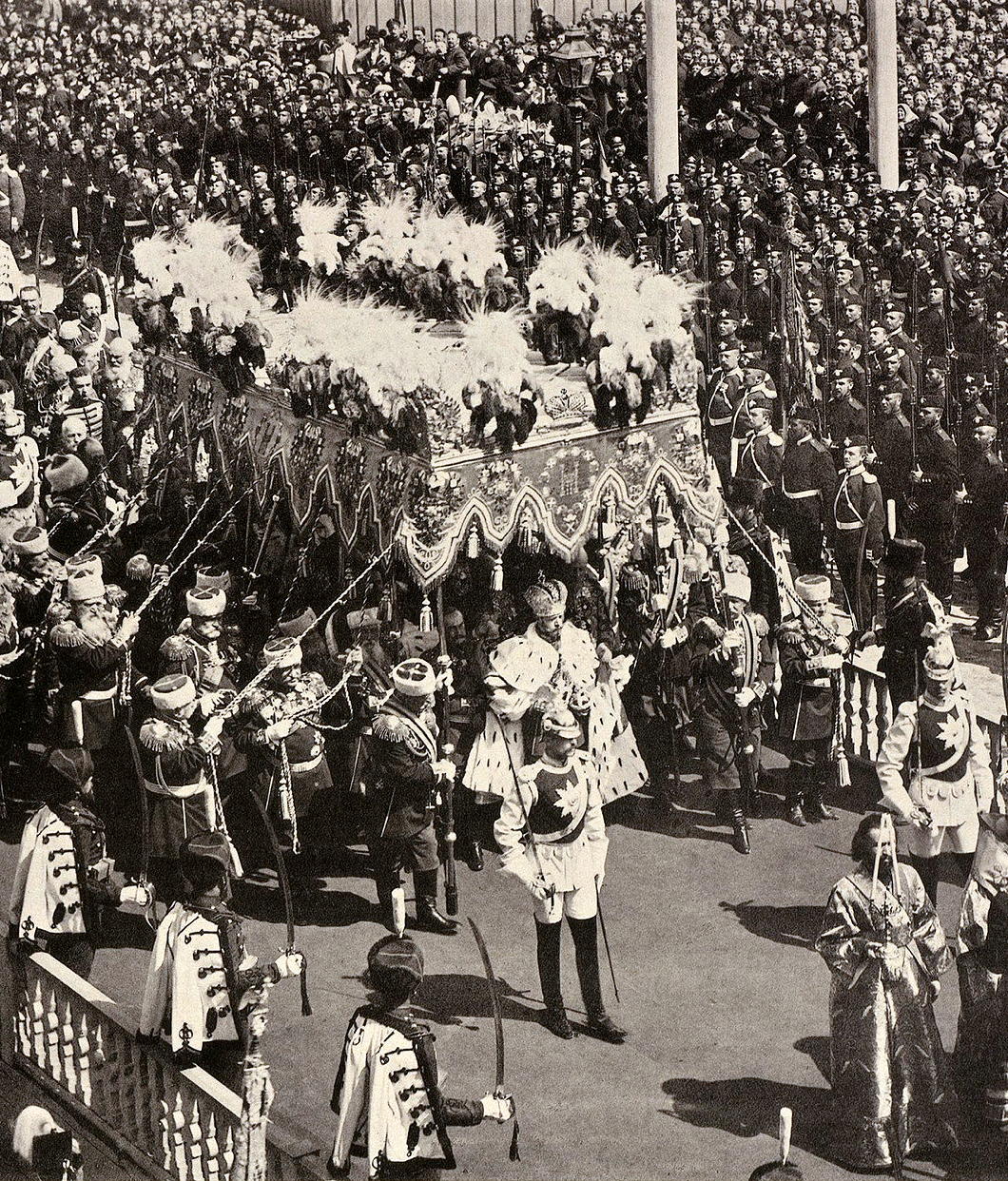Russia
About Andrew Cusack
 Writer, web designer, etc.; born in New York; educated in Argentina, Scotland, and South Africa; now based in London.
Writer, web designer, etc.; born in New York; educated in Argentina, Scotland, and South Africa; now based in London. read more
News
Blogs
Reviews & Periodicals
Arts & Design
World
France
Mitteleuropa
Knickerbockers
Argentina
The Levant
Africa
Cape of Good Hope
Netherlands
Scandinavia
Québec
India
Muscovy
Germany
Academica
Mexican Diplomats
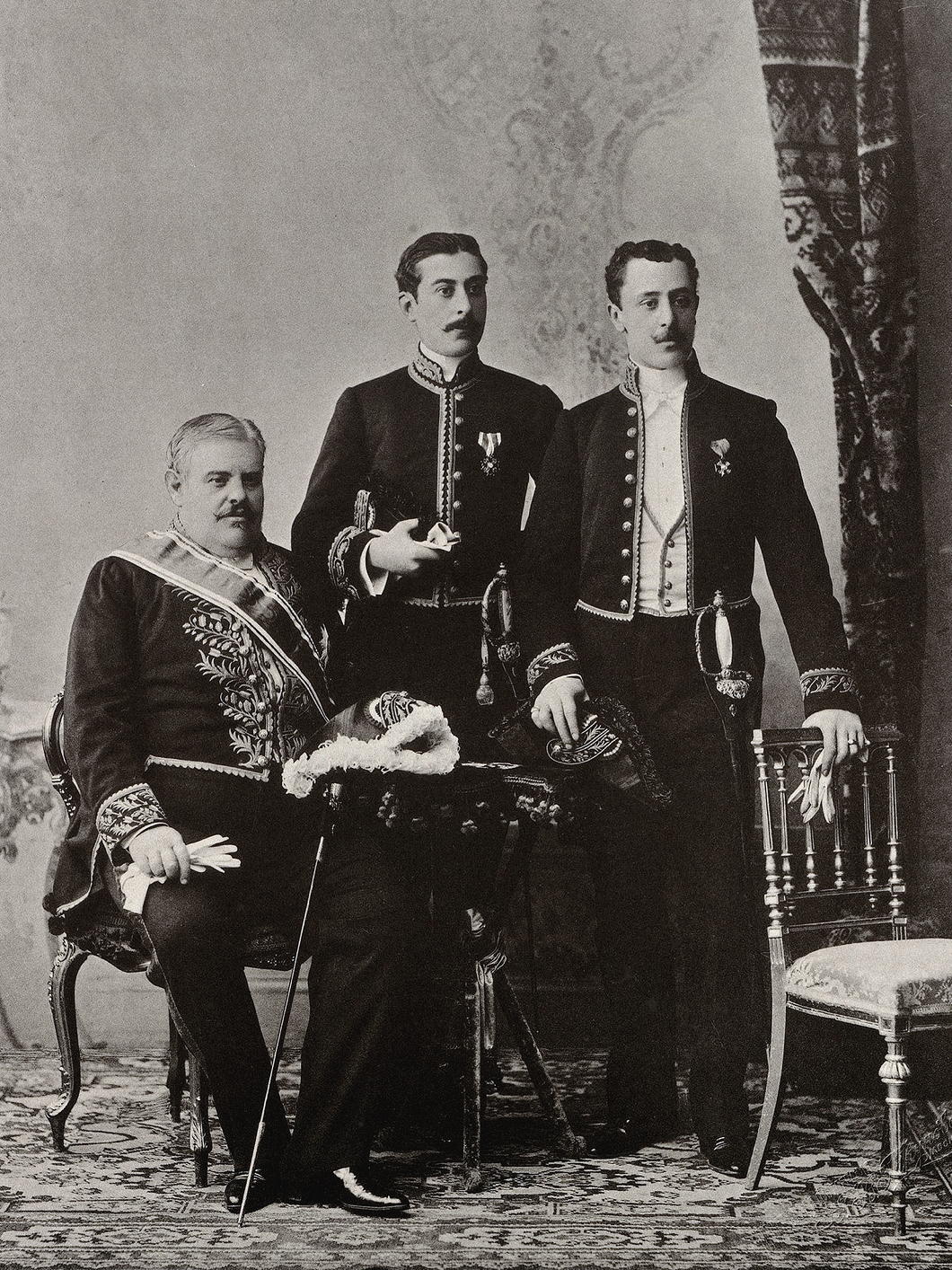
Don Manuel Iturbe, envoy extraordinary and minister plenipotentiary, sits wearing the full civil uniform of an ambassador while the two attachés, Don Miguel Iturbe and Don Juan Beistegui, stand wearing lower grades of diplomatic dress.
All three wear the Order of St Stanislaus — the Polish royal order incorporated into the Romanov orders in 1832.
The records of the Mexican congress shows that Manuel Iturbe was authorised to accept Grand Cross of the order while Miguel (who I presume was Don Manuel’s son though I can’t confirm) and Juan Beistegui had to settle for the ordinary Cross of St Stanislaus.
South African VCs in the Russian Civil War
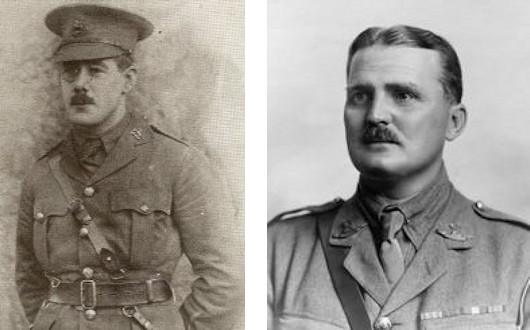
The South African contribution to the Russian Civil War is not very well known, nor particularly well researched by historians of the period. Several South African officers who found themselves in Europe by the time of the armistice ending the Great War volunteered to serve in Russia fighting the Bolsheviks — either with the Allied force there or with the White forces themselves.
Among the South African volunteers were two winners of the Victoria Cross — Major Oswald Reid (above, left) of Johannesburg, and Lt Col John Sherwood-Kelly (above, right) from the Eastern Cape.
The South African aviation pioneer K R van der Spuy — who ended up a major general — managed to serve from the early days of 1914 all through the First World War. His engine failed in Russia, however, and he was taken prisoner after a forced landing in Bolshevik-held territory. The Soviets released him from imprisonment in 1920.
As Cdr W M Bisset wrote elsewhere: “Despite the harshness of the Russian winter and the growing prowess of the Red Army, South African officers were able to make a valuable contribution to the operations of the Allied and White Armies which is well illustrated by the important posts which they held and the awards they received.”
Russia’s Demographic Turnaround
Most 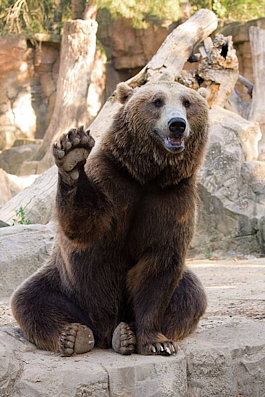 large developed countries have been facing demographic crises, with Russia one of the worst in the past few decades. The Financial Times this week reports, however, that Russia is facing a demographic turnaround: “Rising birth rate, tumbling death rate, and immigration drives population rebound” as the subheadline puts it.
large developed countries have been facing demographic crises, with Russia one of the worst in the past few decades. The Financial Times this week reports, however, that Russia is facing a demographic turnaround: “Rising birth rate, tumbling death rate, and immigration drives population rebound” as the subheadline puts it.
In 2000, deaths at 2.23 million outnumbered the 1.27 million births by nearly a million. In 2013, 1.94 million births finally outnumbered 1.91 million deaths, while the first quarter of 2016 has witnessed a 5 per cent drop in mortality compared to just a year before.
Still, the low birth rates of the 1980s and 1990s will continue to have a reverberating effect on the working-age population, as the children who weren’t born then will obviously not have children and grandchildren. Pension ages are being changed accordingly, rising to 65 for men and 63 for women as compared to 60 and 55 respectively up until now — a Communist hangover ridiculously low in comparison to Western countries.
Despite a perilous economic condition thanks to collapsing commodity prices, Russians clearly feel their country is in a much more stable condition than the topsy-turvy 1990s. There can be no greater vote of confidence in the future than to have children.
Previously: The World Turned Upside Down
Putin: ‘I’d really like to see Europe show some real independence and sovereignty’
‘Europe is facing a specific problem: an influx of immigrants’ the Russian president asserts in an interview for Swiss television
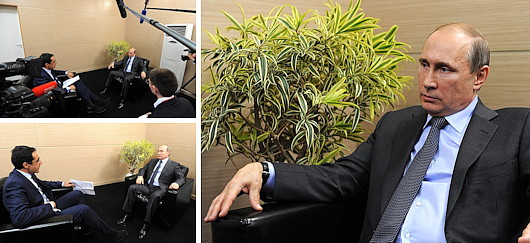
Here are a few excerpts from the interview, dealing with (among other issues) the balance of power, independence and sovereignty in Europe, and relations with the United States.
Vladimir Putin: Bonsoir.
Vladimir Putin: This is done by dishonest and inattentive people. The process of starting a new arms race began from the moment of the United States’ unilateral withdrawal from the ballistic missile defence treaty. Because this agreement was a cornerstone for the entire international security system. And when the United States withdrew from it and began to create a missile defence system as part of its global strategic weapons system, we immediately said: we will be obliged to take reciprocal steps to maintain a strategic balance of power.
I want to say something very important: we are doing this for ourselves, to ensure the security of the Russian Federation, but we are also doing it for the rest of the world, because this strategic stability ensures the balance of power.
Vladimir Putin: My mother and father. My brother, whom I never met, died here during the seige.
Vladimir Putin: I hope not. But I would really like to see Europe demonstrate some real independence and sovereignty and be capable of defending its national interests, the interests of its people and its nations. […]
Vladimir Putin: […] Participation in any military and political organisation or bloc is associated with the voluntary renunciation of a certain share of one’s sovereignty.
I think that at the time, France withdrew from NATO to preserve its sovereignty more than it is possible within the framework of a military bloc. It is not our business to analyse European nations’ foreign policy. But I think you’ll agree that if we need to discuss intra-European affairs with European partners in Washington, it is not very interesting.
Vladimir Putin: I think that this is not so much support for me as the realisation of national interests as the political parties see them.
There are certain tectonic changes underway throughout the world and in Europe within the public consciousness, which are aimed at defending national interests. You must understand that right now, Europe is facing a specific problem, an influx of immigrants. And did Europe make the decision that ultimately led to this situation? We need to be sincere and honest: these decisions were made across the ocean, but Europe must deal with the problem.
Vladimir Putin: Of course. This is just one example, but there are many. But this does not mean – and I already said this – that we should somehow demonise US policy; that is not my goal. They are conducting their policy as they see necessary in their interests.
We must strive to find a balance of interests; we need to invigorate our work, give new momentum to the work by the UN Security Council. The US is certainly a great power and the American people created this nation over several centuries, it is simply an amazing result. But that does not mean that today’s US authorities have the right to travel throughout the world and grab anyone to drag back to their prison or act from a position of “anyone who is not with us is against us.”
We need to be patient and work with our American colleagues to find solutions, the way we have in some areas of our cooperation, such as with the Iranian nuclear issue.
[…]
Vladimir Putin: After our interview, do you think I am mad?
Vladimir Putin: This is part of political struggle; it has been part of my life for quite a number of years. I try not to pay too much attention to it. I simply do what I think is necessary in the interests of my country and my people.
It is not in Russia’s interests to be in confrontation with other countries, but sometimes we are forced to protect our interests, and we will undoubtedly continue to do so. However, we will seek solution not in confrontation, particularly military confrontation, but in finding compromise and mutually acceptable solutions.
With your help I would like to address not those who criticise me, but those who support me. I would like to thank them for their support and tell them that we will continue moving ahead together. Above all, I am referring not to those who portray me [as Stalin], but to those who sympathise with what we are doing and agree with it deep inside.
Merci beaucoup.
Russia’s Classical Future
Design chosen for St Petersburg’s new judicial quarter
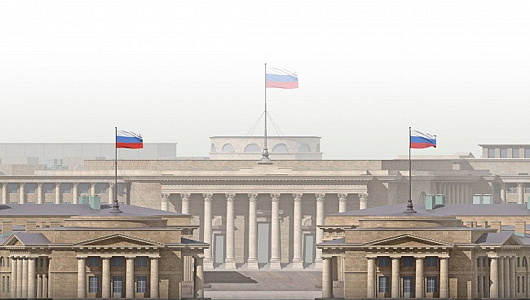
While a vast and multifacted state, the Soviet Union was nonetheless one in which power was highly centralised, not just within one city — Moscow — but even within one complex of buildings, the Kremlin. For the past fourteen years, however, a St Petersburg boy — Vladimir Putin — has been the man at the helm of the ship of state, and while Moscow is still the top dog St Petersburg is increasingly stealing the limelight. The number of commercial bodies (several subsidiaries of Gazprom, for example) moving from Moscow to St Petersburg is growing, and even a few government departments and other entities have moved back to the old imperial capital.
Among these is the Constitutional Court of the Russian Federation, which transferred to the old Senate and Synod buildings in St Petersburg in 2008. The Supreme Court and Higher Arbitration Courts have yet to make the move, however, and a scheme by architect Maxim Atayants has been chosen as the winner of the design competition for the new judicial quarter on the banks of the Neva. (more…)
They Will Bury Us!
But it will at least be a Christian burial
In 2003, the lamentable and vulgar government of Britain launched Beagle 2, part of the European Space Agency’s ‘Mars Express’ programme. It contained a pop song fragment by ‘Blur’ and an “artwork” by Damien Hirst to calibrate its cameras and spectrometers. The whole thing was a failure, contact with Beagle 2 being lost six days prior to its scheduled entry into the Martian atmosphere.
Whereas we sent dull pop music and bad art, the Russians have one-upped us again. To celebrate the fiftieth anniversary of the first man in space, they’ve taken an icon of Our Lady of Kazan aboard the Soyuz TMA-24 mission.
(With apologies to Comrade First Secretary Krushchev for the paraphrased post title.)
New Cathedral in Russia
Holy Trinity Cathedral, Magadan, Siberia
In Russia, they build churches that look like churches. (As can be seen from the above video showing the consecration of the new cathedral). Meanwhile, in Los Angeles…
Victory+65 in Moscow
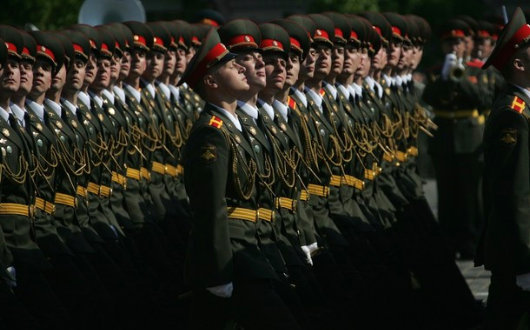
ANOTHER VICTORY DAY in Moscow — sixty-five years now since the Allied Powers defeated the crisply attired Axis of Nazi Germany and her slightly foppish cohort Fascist Italy. Russia commemorates V-E Day a day “late” because the German instrument of surrender entered into force at 23:01 CET on May 8, 1945 — by which time it was already May 9 in Moscow. For this reason most countries within the ex-Soviet sphere celebrate the end of the Second World War a day later than in western Europe. It is also customary on this day for patriotic citizens to wear the orange-and-black ‘Ribbon of St. George’, which recalls the Military Order of the Holy Great-Martyr and the Triumphant George established in 1769 and revived in 1994. The Order of St. George is the highest military honour awarded by Russia after the paramount Order of St. Andrew. (more…)
The World Turned Upside Down
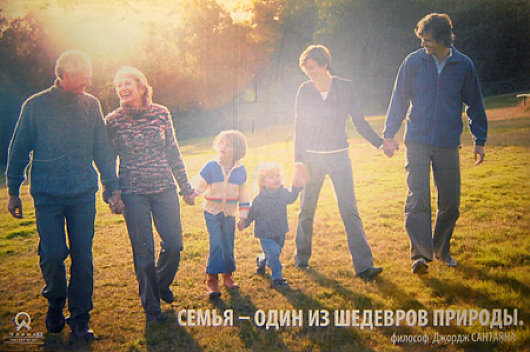
— philosopher George Santayana
I can’t remember who it was that, watching the fall of the Berlin Wall and the collapse of the Iron Curtain, said never in his right mind did he expect that within just a decade Washington would be the chief propagator of worldwide revolution and the Kremlin would be a relatively conservative power, guarding jealously its local sphere of influence. What could add more of a dash of the absurd (and yet, eminently sensible) than the Russian government, facing the worst crisis of population decline of any major power, promoting larger families with a poster campaign quoting the conservative American philosopher George Santayana.
St. Nicholas of the Seven Seas
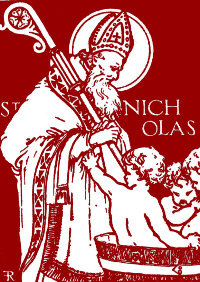 ONE OF OUR correspondents sends word that Russia is to name the fourth of her Borei-class ballistic missile submarines Николай Чудотворец, which is to say “Saint Nicholas”. The Borei-class vessels are the first series of Russian strategic submarines to be launched in the post-Soviet era. The previous subs in the class have been named the Yuri Dolgoruki (after Prince Yuri I, founder of Moscow), the Alexander Nevsky (after the Grand Prince of Vladimir & Novgorod venerated as a saint in the Eastern churches), and the Vladimir Monomakh (after the Grand Prince of Kievan Rus). The Saint Nicholas is of course not the first boat or ship to bear the name of New York’s patron saint. There was HMS St. Nicholas as well as a Spanish naval ship San Nicolas in the 1790s, eventually captured by the Royal Navy and commissioned as HMS San Nicolas. A Sealink (later Stena) ferry named St. Nicholas traversed the Harwich/Hook-of-Holland route from 1983 until it was renamed Stena Normandy in 1991 and transferred to the Southampton/Cherbourg route. Numerous merchant vessels took the saint’s name and patronage throughout the nineteenth century.
ONE OF OUR correspondents sends word that Russia is to name the fourth of her Borei-class ballistic missile submarines Николай Чудотворец, which is to say “Saint Nicholas”. The Borei-class vessels are the first series of Russian strategic submarines to be launched in the post-Soviet era. The previous subs in the class have been named the Yuri Dolgoruki (after Prince Yuri I, founder of Moscow), the Alexander Nevsky (after the Grand Prince of Vladimir & Novgorod venerated as a saint in the Eastern churches), and the Vladimir Monomakh (after the Grand Prince of Kievan Rus). The Saint Nicholas is of course not the first boat or ship to bear the name of New York’s patron saint. There was HMS St. Nicholas as well as a Spanish naval ship San Nicolas in the 1790s, eventually captured by the Royal Navy and commissioned as HMS San Nicolas. A Sealink (later Stena) ferry named St. Nicholas traversed the Harwich/Hook-of-Holland route from 1983 until it was renamed Stena Normandy in 1991 and transferred to the Southampton/Cherbourg route. Numerous merchant vessels took the saint’s name and patronage throughout the nineteenth century.
Victory Day in Moscow
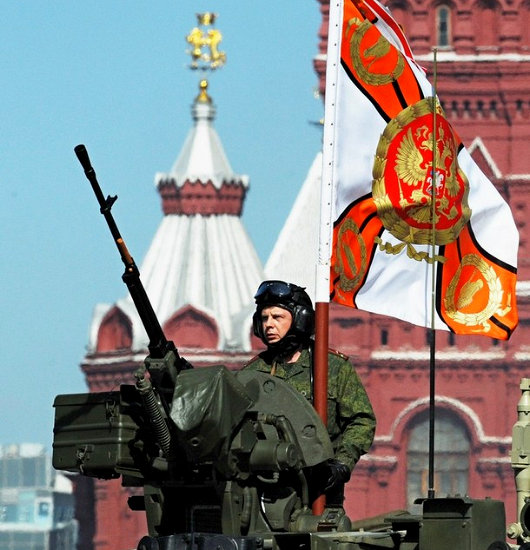
I recently discovered that we receive the television channel Russia Today in our humble little flat here in Stellenbosch, and have spent the past few days enjoying it. They are shockingly truthful (almost nasty) in their reporting of international relations, in so far as the truth — for the moment — tends to favour the Russian case in world affairs, and make NATO look like a bunch of ninnies. Saturday — May 9 — was Victory Day in Russia, in which the defeat of Nazi Germany in the Second World War is commemorated and celebrated. RT showed many minutes of splendid highlights from the great parade in Red Square, and I just sat and enjoyed it.
Russia’s Treasures on the Banks of the Amstel
Seventeenth-century Amsterdam building will, from June, be home to collections from St. Petersburg’s Imperial Hermitage Museum
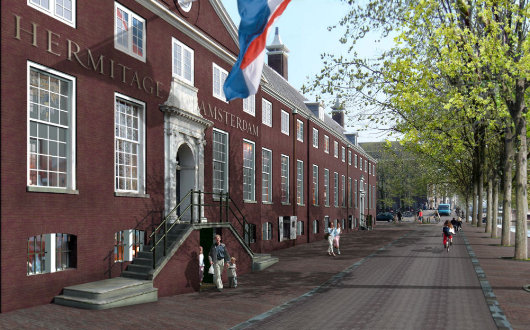
A new 100,000-square-foot space displaying works from the Hermitage Museum in St. Petersburg will open in Amsterdam this June. The Hermitage Amsterdam will be located in the Amstelhof, a former home for the elderly built in 1683 by the Dutch Reformed Church and transformed into a modern exhibition space by Hans van Heeswijk Architects. The opening exhibition, “At the Russian Court” — a “a deeply researched exploration of the opulent material culture, elaborate social hierarchy and richly layered traditions of the Tsarist court at its height in the nineteenth century” — will display 1,800 works from the massive collection in St. Petersburg and continue until the end of January 2010.
‘German’ Poland vs. ‘Russian’ Poland
A curiosity of the 2007 Polish parliamentary election
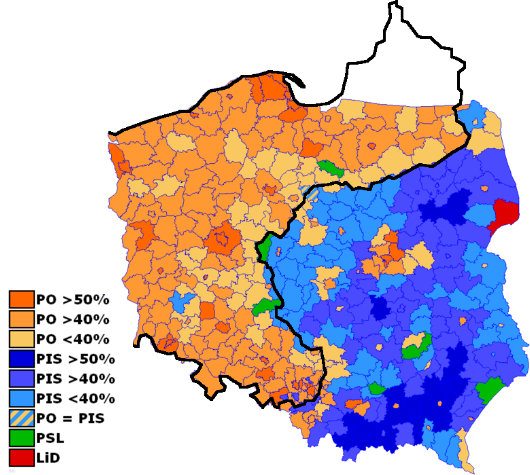
THIS MAP displaying the results of the 2007 general election for the Polish parliament is overlaid with an outline of the nineteenth-century border between the German and Russian empires.
The areas formerly ruled by the German Kaiser tend to back the right-wing liberal Platforma Obywatelska (“Civic Platform”) party, while those formerly ruled by the Tsar tend to support the conservative Prawo i Sprawiedliwość (“Law and Justice”) party.
The green represents the centrist-agrarian Polish People’s Party, while the dark red represents the already-defunct “Left and Democrats” coalition.
Source: Strange Maps
Russia Turns a Cinematic Page in History
Big-budget film celebrating anti-Communist hero & White Russian leader Admiral Kolchak is partly funded by Russian government
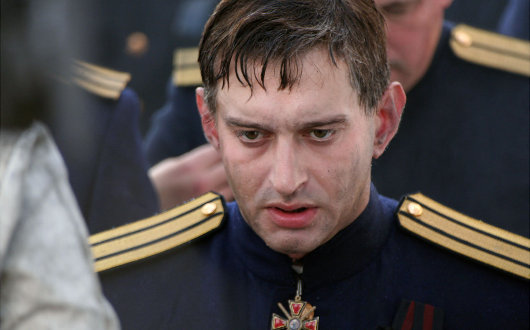
Here’s a film that has it all: naval battles, mutiny, revolution, civil war, brave men, beautiful women, sin, sacrifice, and betrayal on multiple levels. But “Admiral” («Адмиралъ»), which opened in Russia this month, is notable for another reason: this is the first major film depicting the tsarist White Russians as the good guys to receive at least part of its funding from the Russian government. The eponymous hero of the film is Alexander Kolchak, the naval commander and polar explorer who later led part of the White Army fighting the Bolsheviks during the Russian Civil War.
Alexander Solzhenitsyn, 1918–2008
Russian traditionalist, Nobel laureate, feted in the West for criticism of Soviet Communism, then spurned for rejecting liberal materialism

Alexander Isayevich Solzhenitsyn, the most famous Russian writer and historian of our age, has died at eighty-nine years of age. Solzhenitsyn was the earliest to bring first-hand knowledge of the Gulag, the Soviet system of prison colonies and labour camps, to wider Western attention. For this noble task, he was awarded the Nobel Prize for Literature in 1970 and expelled from the Soviet Union four years later, returning in 1994. After the fall of the Soviet regime, he despised Boris Yeltsin’s incompetence, identifying 1998 as the low point of Russia’s recent history. “Yeltsin decreed I be honored the highest state order,” Solzhenitsyn explained. “I replied that I was unable to receive an award from a government that had led Russia into such dire straits.”
He gave cautious support to the presidency of Vladimir Putin, and was pleased that while, in his words, “Moscow is still communist”, there was a growing readiness under Putin to admit (and even broadcast on state television) the crimes and outrages of the Soviet regime.
“Putin inherited a ransacked and bewildered country, with a poor and demoralized people. And he started to do what was possible — a slow and gradual restoration. These efforts were not noticed, nor appreciated, immediately. In any case, one is hard pressed to find examples in history when steps by one country to restore its strength were met favorably by other governments.”
Influenced by his experience in exile in both Switzerland and New England, Solzhenitsyn insisted on the need for local self-government in Russia. “Today I continue to be extremely worried by the slow and inefficient development of local self-government. But it has finally started to take place. In Yeltsin’s time, local self-government was actually barred on the regulatory level, whereas the state’s ‘vertical of power’ (i.e. Putin’s centralized and top-down administration) is delegating more and more decisions to the local population. Unfortunately, this process is still not systematic in character.”
Solzhenitsyn expressed further disappointment with the new Western imperialism being waged against Russia, embodied in the 1999 War against Serbia which turned so many Russian minds against the Western powers they had previously been quite friendly to.
In a recent interview with Der Spiegel, Solzhenitsyn was asked whether he was afraid of death:
“No, I am not afraid of death any more. When I was young the early death of my father cast a shadow over me — he died at the age of 27 — and I was afraid to die before all my literary plans came true. But between 30 and 40 years of age my attitude to death became quite calm and balanced. I feel it is a natural, but no means the final, milestone of one’s existence.”
When the interviewer from Der Spiegel wished him many more years of “creative life”, Solzhenitsyn calmly responded “No, no. Don’t. It’s enough.”
The Holy Saints of Russia
Russia remembers the murdered Tsar St. Nicholas II & his family

Christians in Russia yesterday solemnly remembered the brutal killing of the country’s Imperial Family by the Bolshevik revolutionaries 90 years earlier. Tsar Nicholas II, the Tsarina Alexandra, their daughters the Grand Duchesses Olga, Tatiana, Maria, and Anastasia, and the Tsarevich Alexei have all been added to the canon of saints of the Russian Orthodox Church. The Imperial Family were first officially recognized as saints by the Russian Orthodox Church outside the Soviet Union in 1981, and the Moscow patriarchate extended the same recognition in 2000.
Cousins

Nicholas II, Tsar of All the Russias and George V, the King Emperor.
Previously: Father & Son | Tennis, Anyone?
Father & Son
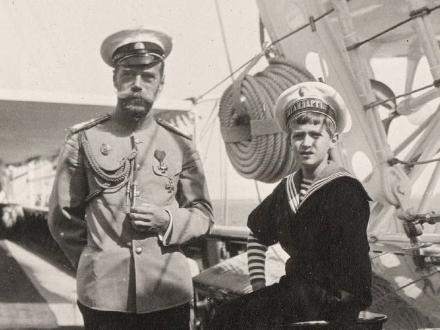
These photos of Czar Nicholas II and his son, the Czarevich Alexei, are from the Romanov family photo album which somehow ended up in the Beinecke Library at Yale University. Nicholas and Alexei, along with their entire family, were murdered by the Communists in the basement of a house in Yekaterinburg, Russia on the night of July 17, 1918. The family having since been canonised (or ‘glorified’, as it’s called in the Russian church) as saints, a cathedral now stands on the site of their murders. (more…)
Search
Instagram: @andcusack
Click here for my Instagram photos.Most Recent Posts
- Burns Tower April 19, 2024
- Patrick in Parliament March 18, 2024
- Articles of Note: 13 March 2024 March 13, 2024
- Cambridge March 9, 2024
- Taken on Trust March 4, 2024
Most Recent Comments
Book Wishlist
Monthly Archives
Categories

